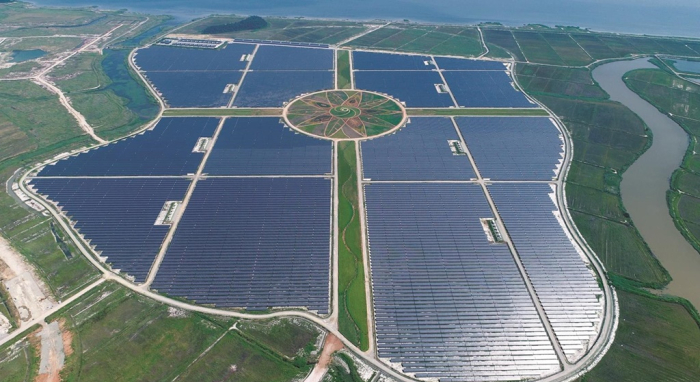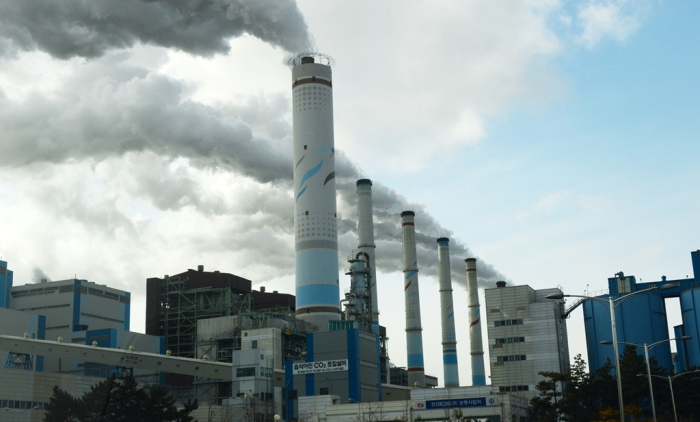Energy
Korea to require power plants to use more renewable energy resources
Government seeks to raise RPS ratio to 25% by 2026 from current 9%
By Oct 07, 2021 (Gmt+09:00)
3
Min read
Most Read
LG Chem to sell water filter business to Glenwood PE for $692 million


Kyobo Life poised to buy Japan’s SBI Group-owned savings bank


KT&G eyes overseas M&A after rejecting activist fund's offer


StockX in merger talks with Naver’s online reseller Kream


Mirae Asset to be named Korea Post’s core real estate fund operator



South Korea plans to require domestic power companies to consume more renewable energy resources for electricity production. The move is a part of the country’s efforts to meet its target of zero carbon emission by 2050 through increasing use of such sources including wind, solar, biomass and geothermal.
The plan is likely to benefit solar power plant operators at the expense of major electricity companies’ profits, while hiking domestic electricity bills, analysts said.
The Ministry of Trade, Industry and Energy on Oct. 6 announced a legislative notice of the revision of a law to tighten the renewable portfolio standard (RPS) ratio. The law requires power companies that operate plants with a capacity of more than 500 megawatts (MW) to use renewable energy sources at more than certain portions of total resources.
TO RAISE RPS RATIO TO 25% BY 2026
The ministry decided to raise the RPS ratio to 25% by 2026 from the current 9%. The government introduced the regulation in 2012 when the ratio had been initially set to stay at 10% from 2022. But the requirement will be escalated to 12.5% in the next year, 14.5% in 2023, 17% in 2024, 20.5% in 2025 and 25% in 2026, according to the amendment.
Such a tougher revision is expected to boost conventional power companies’ expenses. To meet the current regulation, local electricity companies such as Korea Electric Power Corp. (KEPCO) have been buying renewable energy certificates (RECs) from solar power generators rather than increasing use of eco-friendly energy resources. A higher RPS ratio is likely to force those conventional power suppliers to buy RECs more, helping renewable energy operators that produce power and sell the certificate earn more money.
Solar power plant operators have been suffering from weakening REC prices. The spot REC price on Oct. 5 closed at 31,900 won ($26.8) per megawatt hour (MWh), losing 61.8% in three years, according to the Korea Power Exchange.
GOOD FOR SOLAR POWER PLANT OPERATORS
The revision is expected to improve solar power plant operators’ earnings, while hurting profits of conventional electricity producers including KEPCO.
KEPCO’s RPS-related costs surged 59.3% to 2.5 trillion won ($2.1 billion) last year from 1.4 trillion in 2016, according to its data submitted to a lawmaker. The state-run power supplier already spent 1.7 trillion won in the first half of 2021 for the RPS.
The revision is predicted to balloon KEPCO’s RPS expenses as the RPS ratio will rise about 3 percentage points a year on average under the amendment. It already spent billions of dollars when the ratio grew by 0.5-1 percentage point a year from 2012.

HIGHER ELECTRICITY BILLS
The increase in the RPS costs are likely to cause conventional energy producers to hike electricity bills.
“The sharply upward adjustment in the RPS ratio may lead a surge in REC prices,” said Dong-Wook Jerng, an energy systems engineering professor at Chung-Ang University in Seoul. “Pressure to raise electricity bills will be greater than ever if the RPS factor adds to costs given jumps in expenses of power generation fuels such as crude oil.”
A energy ministry official, however, played down such concerns.
“The damage to power companies will not be that serious since the current REC price is so low and power generation costs are expected to fall in line with technology development,” said the official.
The ministry did not estimate how much cost conventional power companies have to spend to meet the revision, the official added.
Write to Eui-Jin Jeong at justjin@hankyung.com
Jongwoo Cheon edited this article.
More to Read
-

-

-

-
 Business & PoliticsS.Korea's president-elect Yoon vows deregulation, tax cuts
Business & PoliticsS.Korea's president-elect Yoon vows deregulation, tax cutsMar 10, 2022 (Gmt+09:00)
6 Min read
Comment 0
LOG IN


